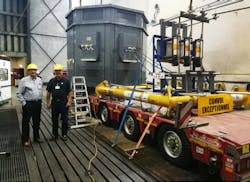A New Generation of Fault Current Limiters Completes Performance Tests
Eriez, the majority shareholder of United Kingdom-based FaultCurrent Ltd. (FaultCurrent), recently completed a round of independent tests of its next-generation Fault Current Limiter (pmFCL), which employs ferrite magnets at the core of its patented design. According to FaultCurrent, the final round of short circuit (fault limiting) tests--conducted at KEMA Laboratories in the Netherlands-- successfully proved that its technology can be safely applied to a power system to facilitate the rapid connection of additional Distributed Generation without an electrical utility having to incur the costs and delays of network reinforcement.
FaultCurrent Chairman and CEO Martin Ansell says, “This is the final hurdle in a seven-year journey that has involved fundamental research, groundbreaking innovation, prototyping and re-engineering, resulting today in a proven market-ready product.” He adds, “We were able to test the short circuit (fault limiting) performance at both 50 Hz and 60 Hz at KEMA’s Laboratories, a world-leader in energy consulting, testing and certification, to confirm that our pmFCL can be used on power grids across the world.”
A number of companies have designed and built Fault Current Limiters using different technical approaches, from the application of Superconducting technologies to the introduction of Power Electronics. FaultCurrent’s approach was to design a truly “fit and forget” product that used simple permanent magnets at its core to provide a dependable, robust and energy-efficient solution that is quick to install. Uniquely, the pmFCL has no operating overhead and requires no maintenance beyond simple inspection.
The pmFCL works by providing additional fault current headroom when it is needed, presenting a low impedance during normal “in service” current flows until an abnormal fault current instantaneously forces the device into a higher impedance state, and in doing so, allows time for the power system’s existing infrastructure to react to isolate the fault safely. Post fault, the pmFCL instantly recovers, ready to protect the network again.
Ansell says FaultCurrent’s momentum has significantly increased since Eriez recently became the majority shareholder. “We have been able to accelerate the completion of our development program and are now working to appoint a network of sales representatives.” He adds, “We look forward to sharing additional updates as we continue to work to bring our state-of-the-art pmFCL to customers around the world.”
For more information about FaultCurrent Ltd., visit http://faultcurrentltd.com.
